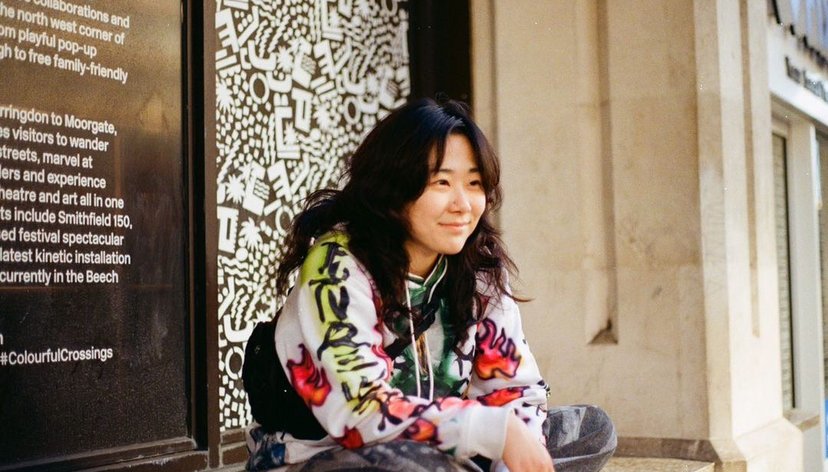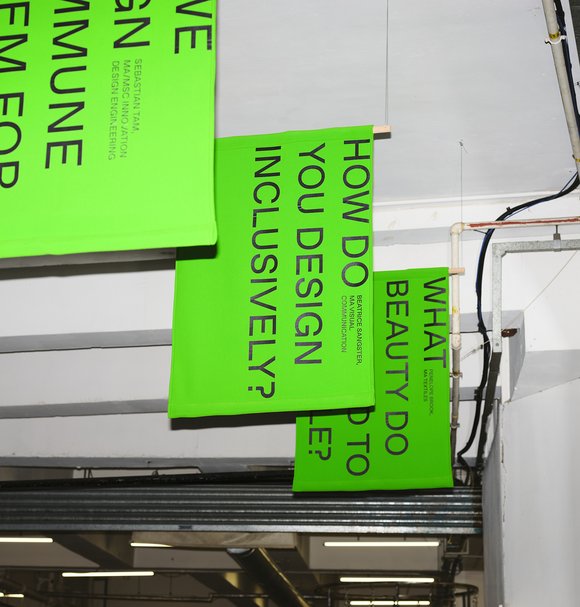
Key details
Date
- 16 May 2024
Read time
- 3 minutes
Disability access in education and the inclusion of neurodiversity are at the centre of Visual Communication MA graduate Beatrice Sangster’s practice. From developing inclusive design approaches to advocating for accessibility rights, discover how studying at the RCA transformed her practice.
Key details
Date
- 16 May 2024
Read time
- 3 minutes
Beatrice Sangster (Visual Communication MA, 2023) is a designer and researcher whose practice is based on neurodiversity and disability inclusion. Across design and technology, social initiatives, and healthcare communication strategies, Beatrice tackles urgent socio-political issues, emphasising care and the necessity for innovation.
On the Visual Communication MA programme Beatrice focused on designing communication systems and models of interaction for neurodivergent linguistic practices. She also collaborated with Design Products MA student Joy Lu to lead the RCA Neurodiversity Society. The pair worked on several projects, including a Helen Hamlyn Award winning toolkit addressing the accessibility of art and design education. Beatrice’s time at the RCA was supported by a Burberry Design Scholarship.

Can you sum up your creative process?
My creative process is shaped by critical making, dialogue and experimentation within a collaborative, interdisciplinary environment. I engage with strategies and agile frameworks for facilitating dialogues between the fields of research and practice, translating and bridging models of exchange and experiences to connect people and communities.
What brought you to studying Visual Communication MA at the RCA?
I was drawn to Visual Communication at the RCA because it has a practical and discursive approach to designing communication as a conversation that can connect people and exchange ideas. The programme fosters a community of critical thinkers and makers who lead the way in social, cultural and political practices.

How has being at the RCA changed you, or your practice?
My time spent at the RCA profoundly transformed me and my practice. It significantly shifted my perspective and approach over time. I have developed a practice grounded in utilising design as a tool for critical discourse, education, problem-solving and decision-making, conducting research in the fields of design and education.
Did you have the opportunity to collaborate with students from other programmes or disciplines?
Engaging with researchers, designers and artists from programmes and disciplines within and beyond the RCA is core to the institution's ethos and integral to the learning environment.
In partnership with Joy Lu (Design Products MA, 2023) I co-led the RCA Neurodiversity Society. Together, we collaborated on several projects and were honoured as recipients of the annual Helen Hamlyn Design Awards: Snowdon Award for Disability.
We launched the Neurodiversity Celebration Week initiative at the RCA, collaborating with SpLD Support (Student Support Services) and forming a partnership with Imperial College London in support of Neurodiversity Celebration Week 2023. We also worked alongside Qona Rankin, Dyslexia Coordinator at the RCA, who fostered a great deal of confidence and entrusted us with various projects.

Were there opportunities to connect with businesses or individuals from your industry on the programme?
At RCA2023 at Truman Brewery, I encountered a former tutor from Central Saint Martins. This led to a collaboration, and together, we worked on an exhibition titled ‘Interwoven: Neurodiversity and the Creative Mind’ at the Central Saint Martins Museum & Study Collection. This initiative serves as an educational and community resource for underserved neurodiverse groups beyond traditional education systems.
We now have several projects in progress. We emphasise the value of craftsmanship and agile practice-led collaboration with institutions and individuals, making with diverse perspectives and skills. These partnerships have flourished from my time at the RCA.
How did the support of a scholarship influence your personal growth, in terms of confidence, skills, or a broader perspective on your field of study?
Engaging at the intersection of design, communication, technology, and the arts, collaborating with artists, researchers and designers across various programmes, has broadened my perspective and communication abilities.
Partnering with Joy, we spearheaded a society, working with innovative research and communication approaches to enact significant change in light of our reserved natures. I view this achievement as significant, as it opens up avenues for diverse forms of communication and access to education and the industry.

Why is the support of scholarships important for aspiring artists and designers today, and how did your scholarship enable you to make a positive impact through your work?
Supporting scholarships for designers is crucial today because it grants access to education for individuals who may otherwise encounter barriers within educational systems. Scholarships enable disability and neurodiversity inclusion for a society where people no longer face educational barriers.
My Burberry Design Scholarship was instrumental in facilitating my work on creative accessibility, disability access in education and the inclusion of neurodiversity in educational settings. It has enabled me to undertake projects focused on developing inclusive design approaches, advocating for accessibility rights, and fostering understanding and acceptance of neurodivergent individuals within educational institutions.
What have you been up to since graduating, and what's next?
At the Helen Hamlyn Centre for Design, I began as a design researcher, working alongside Research Associate Sebastian Roeck on a project focused on developing an inclusive design approach for vocal accessibility. The time here significantly refined my practice, thanks to the education and mentorship I received from various practitioners.
I am currently with the RCA as a Research Associate. This position is part of a partnership between the School of Design and Monsoon Accessorize, funded by Innovate UK (UKRI).
Why do you think design is important to the world today?
Design plays a critical role in challenging and transforming practices while critically assessing its position in culture and society across interdisciplinary landscapes. This engagement reflects a deep involvement in pressing socio-political issues, underscoring values such as care, collectivity and the imperative for alternative narratives, contributing to societal discourse and fostering change.




